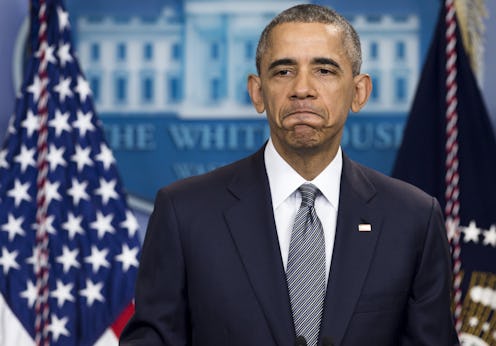News
Apologizing Doesn't Make Obama A Bad President
Since President Obama's inauguration, it seems that his critics have become increasingly censorious of his every decision. One major example is the canard of him being America's apologetic president. Over the years. Obama has faced accusations of apologizing for America in France, England, and Saudi Arabia. Now, some Americans are saying they don't want Obama to apologize for the bombing of Hiroshima during his May visit in Japan.
Those who are against the idea of Obama issuing an apology have claimed that it's not the type of presidential behavior Americans need. They allege that it damages America's reputation. The validity of such accusations is debatable at best, but it's worth delving into why they've made the rounds in the first place.
This image of Obama as a president who consistently demeans and insults America simply by apologizing for its past actions dates back to his first term. He made significant strides to reckon with the uglier side of American history in an effort to improve international relations, traveling to various afflicted nations where he felt work was needed. The Republican establishment and right-wing media saw this as an opportunity to push their own narrative against the left.
Some of his critics call visits of this nature "apology tours," including Obama's visit to Vietnam and Japan. These critiques seemingly derive from the president's attempts to acknowledge various truths of American history. Americans, however, should not conflate maturely facing reality with apologizing for America's existence, but the conflation of the two has brought the president a great deal of bad press.
For instance, back in April 2009 in France, President Obama opened a discussion with remarks on how the U.S. and Europe needed to work together on many issues. One of the statements that got him in trouble was an acknowledgment of America's part in the global financial crisis. After describing the effects each nation had on the entire system, he explained, "Now, there's plenty of blame to go around for what has happened, and the United States certainly shares its, shares blame for what has happened."
In another portion of that address, where he discussed transatlantic interactions, he said:
In recent years, we've allowed our Alliance to drift. ... In America, there's a failure to appreciate Europe's leading role in the world. Instead of celebrating your dynamic union and seeking to partner with you to meet common challenges, there have been times where America has shown arrogance and been dismissive, even derisive.
He received a lot of criticism for these remarks, observant as they are, primarily because many didn't understand why Obama apologized to Europe. But these negative reactions didn't acknowledge that in the same series of remarks, Obama noted Europe's collective failings, too. Honesty used in an attempt to improve a relationship beneficial for Americans is not insulting to America. This is a matter of seeing the bigger picture.
As for his visit to Hiroshima, President Obama said he does not plan to apologize for the atomic bomb the U.S. dropped on the city on August 6, 1945. His reason for this, as outlined in a statement from Deputy National Security Adviser Ben Rhodes, is to offer a "forward-looking vision" of a non-nuclear world, rather than revisit the past. Although he is the first sitting U.S. president to visit the site of the world's first nuclear bombing, he is there to emphasize the friendly ties between former adversaries, while recognizing the difficulties of war that can lead to such tragic situations.
He explained to Japanese broadcaster NHK: "But I know, as somebody who’s now sat in this position for the last seven and half years, that every leader makes very difficult decisions, particularly during wartime." Even so, some critics in China are arguing that Obama's lack of apology will permit Japan to continue to depict itself as a victim.
The vast majority of Americans have historically viewed the bombings of Hiroshima and Nagasaki as the means that were necessary to end World War II, saving both U.S. and Japanese lives. On the other hand, many Japanese people, especially those whose families were affected, believe the bombings were wholly unjustified.
President Obama went on to tell NHK his justification for the decision to make the highly-debated visit:
Since I only have a few months left in the office, I thought it was a good time for me to reflect on the nature of war. Part of my goal is to recognize that innocent people caught in war can suffer tremendously. And that’s not just the thing of the past. That is happening today in many parts of the world.
The president, like most rational Americans, believes that American exceptionalism — the idea that America is unique and special due to democratic ideals, history, and power — is not the best perspective, despite some of his past remarks on the matter. For one, the idea dramatically hurts America's relations with the rest of the world. It also operates as a tool to push an agenda of non-acceptance bordering on protectionism, which is economically harmful, as various studies have shown. Showing compassion for people whom America has previously hurt does the opposite.
No institution is immune to criticism, and that includes America. The president is wise enough to understand this, as evidenced by his apologies on behalf of the U.S. Offering compassion, and even a well-deserved apology, if the situation calls for it, are tools of diplomacy. They're not signs of weakness, but of maturity.
